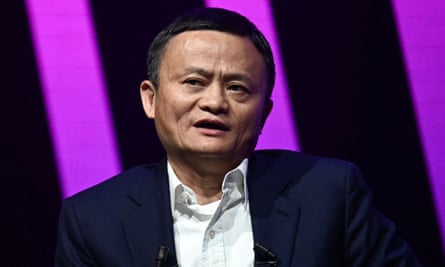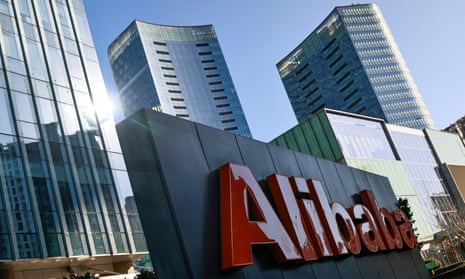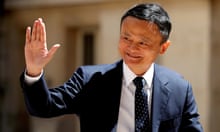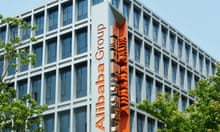Shares in Alibaba surged on Monday after the e-commerce company said that a record $2.8bn (£2bn) fine handed down by Chinese regulators marked the end of an investigation into anti-competitive practices at the company.
Top executives at the company, founded by the billionaire Jack Ma, told investors that while Chinese regulators continued a wider investigation into the sprawling conglomerates in the country’s tech industry, they believed the multibillion dollar fine announced at the weekend marked the end of the focus on Alibaba. The company is listed in Hong Kong and its shares climbed as much as 9% on the management’s comments.
“We are pleased we can put this matter behind us,” said Joe Tsai, the executive vice-chair of Alibaba Group. “With this penalty decision we’ve received good guidance on some of the specific issues under the anti-monopoly law. Other than the mergers review, we’re not aware of any other [antitrust] issues.”
China’s market regulators imposed the fine on Alibaba, worth 4% of its domestic revenues in 2019, for restricting merchants that use its website from doing business or running promotions on rival e-commerce platforms. Alibaba said that it will spend “billions of dollars” to improve the experience of merchants on its site.
While the $2.8bn fine is a record by Chinese regulators, it is also far less than the maximum 10% of revenues that Alibaba could have faced.

While Alibaba no longer faces any further investigations, it still has to comply with a “comprehensive rectification” programme as well as scrutiny of past mergers and acquisitions.
Alibaba has become the lightning rod in the crackdown on big tech after Ma, one of China’s most popular, outspoken and wealthiest entrepreneurs, gave a blunt speech in 2020 criticising national regulators that reportedly infuriated the president, Xi Jinping.
After the comments, Chinese regulators blocked the $34bn stock market flotation of the Alibaba online payments subsidiary Ant Group, which would have been the biggest share offering in history, and Ma disappeared from the public eye for three months.
Last month, Beijing ordered Alibaba to sell off some of its media assets, which include Hong Kong’s South China Morning Post, as the Chinese government cracks down on the growing public influence held by the country’s sprawling tech conglomerates.
In a separate development on Monday, China’s central bank announced that Ant Group will restructure as a financial holding company, a move expected to curb its profitability and valuation.
The People’s Bank of China said that under a “comprehensive and feasible restructuring plan”, Ant would cut the “improper” linkage between the payments service Alipay, the virtual credit card business Jiebei and the consumer loan unit Huabei.
The central bank also asked Ant to break its “monopoly on information, and strictly comply with the requirements of credit information business regulation”.
The company has agreed to improve corporate governance and “rectify illegal financial activities in credit, insurance and wealth management”, the central bank said.
The central bank said it had also asked Ant to control its leverage and product risks, to control the liquidity risk of its flagship fund products and to “actively lower” the size of its massive Yu’E Bao money market fund.
The measures “set an example” for financial regulation of the platform economy”, the state-backed Economic Daily newspaper said.
“Ant Group attaches great importance to the seriousness of the rectification,” the company said.
It added that it planned to set up a personal credit reporting business and fold its two flagship lending businesses into its consumer finance company.









